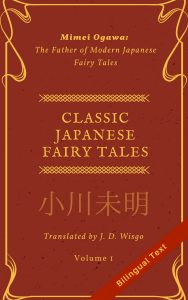After doing translations of Japanese fiction for over two years now, I’ve gradually moved from the stage of just putting translations on my blog informally to releasing them in E-book form on Amazon. My first two books were translations of a classic SF Japanese author (Juza Unno), and while that was a great experience, for my next book project I wanted something completely different.
After some searching around I finally discovered Mimei Ogawa (小川未明), a classic author from nearly a century ago that is known as one of the prominent figures that created what you can call modern Japanese children’s literature. I began to read his stories, and was attracted by how they managed to have a philosophical depth (touching on topics such as the afterlife and our connection and understanding of nature) despite relatively simple language and plot structure. I especially felt these stories charm when listening to voice narrations, which are freely available on Youtube. While there was some translations already published of his stories, a majority of them were quite old and either out of print, or not available in Ebook format. One of the stories I read, “The Mermaid and the Red Candles” (a title sometimes translated as “The Red Candle and the Mermaid”) seemed to be available in adapted form all over the internet, but I wasn’t able to find a version that I was satisfied with so I decided to include that as well.
Besides enjoying the subject matter, my other main condition for translation projects is that the content length is manageable so that I can finish things up in a few months (given I am working in evenings in weekends on this as a side project). I ended up reading to reading or listening to part of at least 15-20 of Ogawa’s stories, and selected a handful that I enjoyed so that I could get things done in a reasonable amount of time.
While there were a few parts of these stories that were a little tricky to understand in Japanese, judging from those I have read Mimei Ogawa’s stories generally contain relatively simple grammar and vocabulary, so I felt these might be good for those studying Japanese and wanting to get into Japanese literature, or maybe even translation itself.
So I decided to publish the E-book with two versions of the stories: one part with just the English translation, and one part with the English interlaced with the original Japanese text, paragraph-by-paragraph in order to make comparison easier for students of Japanese. While I haven’t given a word-by-word explanation, you can use the Kindle reader to look up Japanese words quickly without having to pull up a physical dictionary. Alternately, you can cut-and-paste into Google for a detailed lookup.
I’m planning an article the describe the process of making this Ebook (and potentially article(s) about translation details), but for now I’ll just say you can get it here for the low price of $0.99 USD (or equivalent in your country), at least for the time being.
If you are interested in fairy tales or Japanese literature, or would like to support my future blog and translation projects, please consider purchasing this E-book. If things go well I’d like to make a second volume, and eventually a paper book as well.

That’s very cool, thanks, I’ve just bought it!
Thanks, that’s very nice of you to purchase the book, and also to comment.
I hope you enjoy it!
Thanks, I always enjoy reading your blog although I rarely comment. I’m self-taught Japanese as well, although not as advanced as you are!
One comment for anyone getting the book is that another way to use it for Japanese learners is in combination with Aozora, so that you’re not distracted by the English. I’m currently reading through the first story on Aozora, and consulting the translation about parts that I’m confused about. Since the English / Japanese section has interleaved paragraphs, it’s easy to find a given section.
Glad to know you have been enjoying my blog (:
Good point about the ability to use Aozora Bunko. I mentioned that in the inside cover, but some people might miss it.
Also, please consider writing a review on Amazon for the book.
Thanks!
Thank you very much for making this available in parallel English-Japanese. It’s very useful in my Japanese study.
I used to be a professional translator (like, more than two decades ago, and only technology, not literature), and haven’t used my Japanese much since. It got very rusty, and I have spent the last nine months working on getting it back.
I would like to encourage you to be a bit more free in your translation. For instance, you wrote: “… lonesomely illuminating the turbulent sea” . Google for “lonesomely” produces no natural English texts. Instead, I would suggest that after you translate to English, you put the Japanese aside, read the English, and fix unnatural wording. Perhaps this passage could read “… illuminating the lonesome, turbulent sea.”
Thanks for the feedback and for reading.
I see you point in this case, however since the work is around 100 years old I have went for a certain style. But will keep it in mind.
Oh, and the process you suggested of putting aside the Japanese text is exactly what I have been doing. But surely I have room to grow. Thanks